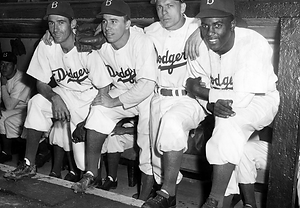Better World Films
History Matters.
PROJECTS

Five Little Girls: The Life and Work of Dr. Mary McLeod Bethune
The importance of the life and work of Dr. Mary McLeod Bethune in American history, education, culture and racial justice cannot be understated. Why then, nearly sixty-five years after her death, has there been no feature-length broadcast documentary produced on Dr. Bethune?
The case for such a production takes on heightened importance due to two factors:
-
In 2020, a statue of Dr. Bethune will be placed in Statuary Hall in the U.S. Capitol. The Hall features two statues from each state, chosen by their respective legislatures. Florida has in the past been represented by statues of John Gorrie, the inventor of the air conditioner, and The statue would be the sole statue of an African American female in DC.. A documentary lacking footage of this historic placement would be at best incomplete, at worst irresponsible.
-
Bethune’s key years in Daytona were between 1904 and 1942, the decades in which she founded and eventually assumed the presidency of what would come to be known as Bethune-Cookman College. Dr. Bethune died in 1955, and there remain only a small number of elders who knew or
worked intimately with her—one being Dr. Bethune’s assistant, Ms.
Senorita Locklear, age 93. It is imperative to begin production of the
documentary before Ms. Locklear and others who knew Dr. Bethune can
no longer be interviewed.
Recognizing that further delay will result in the significant diminishing of the ability to capture these two aspects of Dr. Bethune’s life and legacy, Better World Films LLC, incorporated by Daytona State College professors Eric Breitenbach and Dr. Leonard Lempel, has undertaken the production of the definitive feature length broadcast documentary. Pre-production has been underway for several months; production will begin in October 2019.
2. Components and Locations of the Documentary:
1. In Daytona Beach and other national locations: interviews with scholars, historians, African-American personalities, and Bethune-Cookman University faculty, students and staff. These interviews comprise the foundation for the story of Dr. Bethune’s life and legacy.
2. In Daytona Beach: interviews with regional elders who knew and associated with Dr. Bethune during her time in Daytona Beach. These interviews provide what “scholar” interviews cannot: glimpses into Dr. Bethune’s life made possible by people who interacted with her on a daily basis.
3. In Daytona Beach: on the campus of Bethune-Cookman University, filmed performances by an acclaimed African American (female) actor, on a soundstage, reading from Mary McLeod Bethune’s writings. These scenes bring Dr. Bethune to life in a way that third party interviews cannot.
4. In Daytona Beach: scenes and location interviews on Bethune-Cookman University campus.
5. in Pietresanta, Italy: Dr. Bethune’s statue is near completion in Pietrasanta. Documentary footage of the sculpting and foundry processes and an interview with Florida sculptor Nilda Comas will be gathered.
6. in Washington DC: Documentary footage and corresponding interviews from the Mary McLeod Bethune statue at Lincoln Park.
7. in Washington, DC documentary footage of the Comas statue being installed in the capitol.
8. In Daytona Beach, review and selection of archival materials to include in the film from the Bethune Cookman University archives and Library.
9. In Washington, DC, review and selection of archival materials to include in the film from the Mary McLeod Bethune Council House National Historic Site, the Library of Congress and other such institutions.
3. Schedule of Production
May - October, 2019 – organization and planning
October 2019 – interview regional elders (DB); scenes and interviews on B-CU campus
November 2019 – January 2020 – archival materials research (DB, DC)
August 2021 – Scholar interviews (DB, other national locations) ; statue creation, foundry process (IT, USA)
September 2021 – Film the Bethune statue arriving in Daytona Beach
November 2021 - Film actors on soundstage reading MMB writings (Atlanta)
February 2022 – statuary Hall installation and interviews (DC)
March/April 2022 – Post production
PrPrevious Projects - Better World Filmse - Better Worlds Filmsvious

Heading 1
Heading 1
Breaking Barriers: Oral Histories of Jackie Robinson in Daytona Beach tells the story, through the eyes of locals who lived in Daytona Beach in 1946, of Jackie Robinson's breaking of the color barrier in Major League Baseball.

Being Black features black college students from Bethune-Cookman University, Stetson University and Daytona State College as they discuss their African-American experience

Hoppin' Rattlesnakes: Oral Histories of Beach Racing in Volusia County, 1903 -1958 is a documentary produced, directed and written by Len Lempel and Eric Breitenbach. The film was produced for the Halifax Historical Society, by Lempel, Breitenbach, fayne LeVeille, Preston Root and Biz McKim. The film featured interviews with racers who compted on the beach land speed and oval tracks in the early part of the 20th century, an era which saw thew founding of NACSAR and the Bill France economic juggernaut